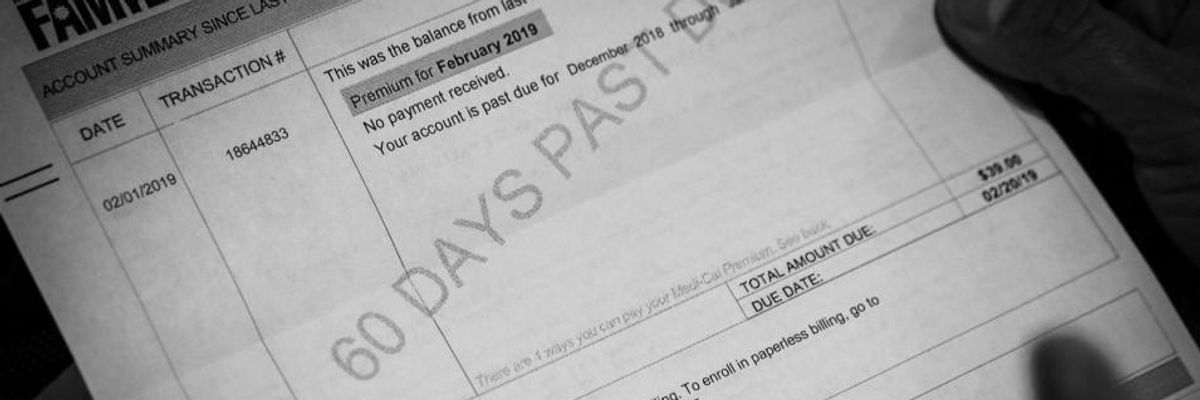Americans are drowning in billions of dollars of medical debt, which continues to grow through this crisis. In the midst of a pandemic, ending surprise medical billing and the toll it takes on those of us already going through medical trauma is more critical than ever. Congress finally came to an agreement to stop surprise bills at the end of December.
Why did it take so long to solve, when surprise medical bills have been a growing problem for years? Hedge funds and private equity firms making profits off our misery fought this law, and threaten any future health care reform. "We've started to realize it's not us versus the hospitals or the doctors, it's us versus the hedge funds."
If you go to an E.R. and wind up on a ventilator, you have no control or even no idea who is treating you, let alone are able to stop and ask them--in the midst of an emergency--whether they take your insurance. When your insurance company does not cover the doctor and/or medical facility you are at, then you may be forced to pay the entire bill (which could be thousands, tens of thousands, or hundreds of thousands of dollars.) This is what's commonly known as a surprise medical bill. And where hedge funds and private equity firms drain more money out of sick and vulnerable patients.
Nobody should have to deal with these astronomical bills while just trying to stay alive.
I experienced firsthand the anxiety and emotional stress that accompanies a surprise medical bill a few years ago. First I was diagnosed with cancer. While I was reeling from that, I wound up in the hospital for two days--and then received an $93,089 out-of-network hospital bill in the mail. Some days I didn't even have the strength to open up my mail anymore to face more threatening notices.
To fight this bill, I had to work with the several doctors who treated me to update my patient record and write letters of appeal, while enduring chemotherapy appointments like clockwork every two weeks. All while the scary medical bills kept arriving in my mailbox.
After several months of disputing the bill through the formal appeals process and living with this additional trauma, my insurance backed down and covered the hospitalization costs. I can understand how people are forced to give up in despair, and face a lifetime of medical debt they can never crawl out from under.
Nobody should have to deal with these astronomical bills while just trying to stay alive. Surprise billing also costs everyone, whether or not you are directly affected with a bill. Fixing it, forcing insurance companies and health care providers to come together, will hopefully lower premiums for all.
Well-funded special interests fought all the various solutions on the table. They won the first rounds, using their waves of money to drown any chance at reform at the end of 2019 when a bipartisan fix appeared within sight. They fought so hard, with so many millions, because surprise medical bills mean big profits for the private equity and hedge fund industries.
Private equity firms are collections of rich peoples' money invested in private businesses, looking to earn profits greater than what they could get on the stock market, real estate etc, while hedge funds are rich peoples' money invested in nearly any asset class and are even more focused on short-term profits.
Because of the private equity and hedge fund firms' combined lobbying efforts and the politicians they back, there was no action on solving surprise medical bills for over a year (or the past several years for that matter), while patients continued to suffer.
Now the negotiations will happen between the professionals, and you get to stay out of it and concentrate on recovery from whatever illness or procedure that produced the surprise bills in the first place.
This compromise is not a perfect solution--by pushing arbitration with lawyers over using standard Medicare payment rates for services, these firms hope to keep most of their price gouging profits, and all of our health care costs continue to be inflated.
Also ground ambulances were excluded from this law, which means people can still face earth-shattering bills from emergency ambulance services (which are another juicy revenue source for private equity firms).
Patients need a solution that includes ground ambulances. But larger-term if we want to lower the cost of health care in America for everyone, we must face the effects of industry consolidation. As many smaller physician practices are on the rocks in this pandemic, vulture investors buy up doctors' practices, increasing their own share of the health care industry.
Even under President Biden and a Democratic House and Senate, some things don't change. Future health care reform will not only involve the powerful and well-financed insurance, pharmaceutical, and doctors' lobbies wanting to make money, but hedge funds and private equity firms seeking their profits too. And we all wind up paying for it.

